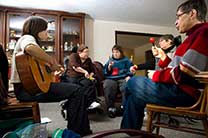Working With a Support Service Provider
Chapter Five explained some of the procedures involved in hiring and managing support services for individuals with disabilities. This section goes into greater depth.
Parents choosing support services may first want to study the regulations governing them. All community agencies, while unique, must comply with the same rules. Even when families are paying for services with private funds, agencies may have to follow the same basic regulations governing publicly funded agencies or programs. Because many of the regulations governing DD services assure health and safety and protect individual rights, parents who are privately paying for services may want to look to the regulations as guidelines.
Contracting for Services
Families should be certain that the following issues are explained and expressly included in any agreement with an agency provider:
- The type of support services to be provided;
- The days and times that the services will be provided;
- Staff-to-consumer ratios (if applicable);
- Responsibility for back-up staffing and the process if back-up is needed;
- Minimum hiring requirements for direct-support staff;
- Training requirements for direct-support staff;
- Procedures for addressing issues with direct-support staff;
- The chain of command and guidelines for whom to contact with concerns;
- Procedures for communication between families and provider, including what situations require notification to families and how and when the information will be communicated;
- If transportation is being provided by support staff, the requirements for insurance, driving record checks, and vehicle maintenance; and
- A conflict resolution procedure.
Individual Service Plans
When services are being provided with DD funds, an Individual Service Plan is required for each person. The plan is developed by the person’s interdisciplinary team, including the individual, guardian, anyone else the individual selects, and professional or support staff working with the person. Staff from the county DD board or the service provider writes the plan, which describes the nature and scope of services to be provided. Information to assist direct support staff in providing the services will also be included.
When a person is receiving services in more than one area (i.e. residential and vocational) from the county DD board, the plans for each service have to be integrated. Service providers in each area will work together to develop the individual service plan.
Setting up Services
Typically, a representative from the agency (a social worker, manager, or program coordinator) will work with the families to set up support services. Family involvement in starting up services will vary, depending on the scope of services, consumer preferences, and agency policies. The amount of time it takes to start services may also vary. Recruiting, screening, and training direct support staff can take a considerable amount of time.
Communication with Agencies
Families should clarify in the beginning how communication will take place between families and agency staff. Although parents may confer with the staff person on duty about plans for the weekend, other issues may need to be discussed with a manager or supervisor. Parents will want a contact person to whom to speak about problems with staff. The agency staff should also know how parents want information reported. For example, if there is a maintenance problem with the house, whom should the staff call? It may help to set up a schedule of meetings between the parent group and the agency. The meetings can provide an opportunity to review what has happened and address any concerns.
Making the Partnership Work
Once an individual and family choose a residential service provider, clarifying the issues below will help establish a good working relationship and avoid potential problems.
- Ask for the titles and names of the people who perform key functions. Functions to ask about may include:
- Management of direct support staff;
- Nursing/medical care (who talks to the doctor, makes sure that medications are purchased, etc.);
- Maintenance and repair concerns; and
- Financial needs (including who handles personal funds and billing for services).
- Understand the chain of command. Who is to be contacted initially if there is a problem, and what is the chain of command if the problem is not resolved?
- Clarify procedures for emergency situations (injuries, behavior crises, staff that do not show up for work, etc). Important information includes the names of those to contact and those who are responsible for addressing problems.
- Hold regular meetings between parents and the manager or administrator. Although most problems will be resolved as they arise, meetings will provide an opportunity to review issues and make changes in procedures to prevent future problems.
- Discuss issues among the families prior to taking a problem to the agency. Everyone in the group should agree before approaching the agency. It can be difficult and time-consuming for agency managers to deal with each family separately, especially when there are differences in expectations.
The Rights of Individuals with Mental Retardation and Developmental Disabilities
The Ohio Revised Code mandates the protection of the civil rights of people who have mental retardation or developmental disabilities. These rights are listed in Appendix B of this manual. Agencies that provide supports are required to explain these rights annually to the people they support, guardians, and agency staff. For people receiving support, the rights must be presented in a manner that they can understand. The agency is also required to provide copies of the rights as well as a list of agencies to contact to report a violation of an individual’s rights. Agencies and staff are mandated by law to report any violation of a person’s rights immediately to the county DD board.
Health & Safety
The first priority of service providers is to ensure the health and safety of the individuals they support. Reaching this goal will depend on the type and scope of support. For example, the obligation to ensure safety in a group home with 24-hour services differs from a provider assisting an individual only with banking and paying bills.
Sometimes safety seems to conflict with individual rights. If, for example, a resident is harming himself when he is left alone in a room, his or her right to privacy may have to be compromised. Support providers must weigh the risk to safety against the possibility of denying rights. Without posing an immediate risk to health or safety, staff will try to assist an individual to change the way he is doing something in order to ensure safety. Staff may, for example, explain the possible consequences of an act, offer safer alternatives, teach new skills, or adapt the environment. If these attempts are unsuccessful and intervention could result in the denial of a person’s rights, staff will allow the person to make his or her own decision unless there is an imminent risk of danger.
Decision Making
Parents at times complain that service providers do not include them in day-to-day decisions concerning their child. One mother felt frustrated because, in preliminary interviews, the staff emphasized the importance of family involvement, but when her son moved to his new home, they seemed to be advising him to make decisions without his parents’ input. Ironically, many providers complain that some parents make it difficult to promote self-determination and choice.
Parents and providers have the best interests of the individual with a developmental disability at heart. The conflict arises in their perspectives.
Parents have spent a lifetime being responsible for their son or daughter. They are acutely aware of their child’s vulnerability and have likely spent many sleepless nights worrying about his or her safety and happiness.
Providers, on the other hand, are not only ethically obligated but also legally mandated to empower the people they support to make their own decisions and exert maximum control over their lives. This philosophy is at the core of the curriculum of the staff members’ education.
Everyone wants the child to enjoy a high quality of life. The difference is how “quality of life” is defined. This dilemma is not new or unique. The conflict between what children want and what our parents want for us is universal.
Service providers are obligated to look to the individuals they are supporting to define their own quality of life. Staff should be trained to respect the personal choices made by those for whom they work. They attend both to what the person says verbally and also what his or her responses to situations say. No doubt staff sometimes let their own opinions or priorities influence the individual’s choices. At least as often, however, children will express their true wishes to staff but not to parents, because they do not want to disappoint parents.
There is only so much that a family and provider can do to avoid these conflicts. One way to head off some problems is to come to an initial agreement about the kinds of choices in which parents or others will be involved. The child’s preferences need to be included in this agreement. Even if a parent is the legal guardian, providers, parents, and their children should clearly understand how decisions will be made.
Rituals & Routines
The fundamental goal of residential services is to help an individual to lead a self-determined life. Self-determination starts with control over daily rituals and routines. This is an area of great importance to everyone. Orientation training for direct support staff often includes asking them to list the steps in their daily routine. There are always as many different rituals as there are people in the group. Even more interesting is how resolute the staff become about the importance of their rituals. This exercise exemplifies for staff the importance of control over daily rituals for the individuals they support. Staff members are encouraged to make every effort to allow individuals to maintain the rituals they find important.
The other people living in a home and, to some extent, staffing issues will affect daily rituals and routines. For example, if three people are sharing a house with one bathroom, and each of them likes to shower before work, some compromises will be necessary to guarantee that everyone gets to work on time. Likewise, if all three people in the home need a staff person with them at all times, but the budget allows for only one staff per shift, all three individuals will have to agree on a particular restaurant, movie, or outing. Agencies will make every effort to minimize these compromises and make sure they are made fairly. However, some situations will surely require compromise.
Concerns related to what is called “best practice” can also affect daily rituals. Policies and procedures related to normalization, community integration, active treatment, age appropriateness, and other concerns are often developed in response to past abuses or inappropriate practices. The importance of assuring appropriate and fair treatment of individuals receiving residential supports cannot be overstressed. Occasionally, however, the effort not to repeat past mistakes can interfere with an individual’s preferences and desires. Although, ultimately, the individual receiving supports should expect his or her choices to be respected, staff, at least initially, may attempt to encourage what may be viewed as a better choice.
For example, age appropriateness of one’s clothing, activities, or interactions can help prevent discrimination in the community. People who behave in an “age appropriate” way will be accepted as adults and are less likely to be victimized or treated unfairly. Therefore, staff would want to discourage a 40-year-old woman from carrying a Barbie Doll to the local restaurant and playing with it during dinner. If the woman, however, really wants to carry the doll, the staff must make a judgment call.
Sometimes staff members’ idiosyncrasies can cause problems as well. Staff are people, too, and come to their job with individual ideas, life experiences, and cultural backgrounds. Many of the functions staff perform in a home (cleaning, cooking, planning recreational activities, caring for clothes, etc.) are things that we all do in daily life, but never in exactly the same way. Consider, for example, the familiar family debates about squeezing the toothpaste tube or hanging the toilet paper. It is unrealistic to expect that direct support staff will complete routine household tasks exactly as parents would prefer. Staff are not necessarily being disrespectful. Rather, it is impossible to keep track of how several different people like to have everything done. Discussing negotiable and non-negotiable issues in advance and putting them in a letter of intent or life plan will help to avoid some of these conflicts. Some discussion and compromise will be needed for the rest.
Finally, certain rules and regulations can change the daily routine in a home. For example, state licensure regulations require that a certain number of fire drills have to be run each year, so everyone might have to get up in the middle of the night and go outside in the cold to wait at the designated spot. This is not a routine that most people would choose in their own homes.
Parents and other people in an individual’s support network can help maximize personal choice in daily routines and rituals. Parents can meet routinely with their children and the staff to talk about schedules and planned activities. The group can work out creative ways to make sure that everyone gets as much choice as possible in his or her routine. Issues affecting individual routines, such as age appropriateness, can be discussed in team meetings and when the ISP is revised in order to come to a consensus about the best interest of a person. Staff and parents can often support personal choice within the parameters of accepted best practices.
Supporting Relationships
Support staff should promote friendships between the people receiving supports and others of their choosing to prevent loneliness or isolation. Parents should be aware of some concerns specific to the development of relationships.
- Staff may be able to help individuals connect with other people or find opportunities to meet other people, but staff cannot choose a person’s friends.
- Staff cannot support a friendship if it endangers a person’s safety.
- Staff cannot interfere with a relationship just because a parent does not approve.
- Staff may need to intervene if a relationship infringes on the rights of the other people living in the home.
- Staff may not be able to support a relationship if it involves providing services to another person with a disability who is not receiving services from the agency.
Confidentiality
Each person receiving services has the right to confidential treatment of his or her records and personal information. Before a staff person speaks to a doctor, therapist, or anyone else about an individual, they must receive permission from the individual or a guardian. Additionally, the information in an individual’s records can also not be shared with others without first getting approval.
Confidential treatment of information includes not speaking with parents about other housemates receiving services. Some families working on collaborative projects have made a group decision that the provider can discuss certain issues about the individuals with all of the parents. This is a very personal decision, one that should be reviewed periodically to be sure that it continues to be appropriate. It would not be appropriate for individuals who are their own guardians and are not in agreement.
Medical
The procedures used by support providers to assist with taking medications and attend to other medical needs are strictly regulated. Parents and families can make judgment calls about giving over-the-counter medications or placing an Ace bandage on a sore joint. But staff must have a doctor’s order before performing such tasks. Many decisions require a level of medical knowledge that only trained nurses or physicians have. Direct support staff members do not have the training or knowledge to make safe medical decision beyond basic first aid.
Administering medications is a major area of concern. Many individuals receiving residential services have trouble taking medications independently. Administering medications requires a nursing license, but it is neither practical nor financially feasible to have nurses available when individuals need to take medications. Delegated nursing rules have been established in order to make sure that medications are taken safely.
Delegated nursing permits unlicensed staff to assist a person in taking medications or performing other medical tasks, under the close supervision of a licensed nurse. Staff must complete initial training and pass a written test and practical exercises. The staff members are then closely supervised and required to receive ongoing training.
Rules in relationship to delegated nursing include:
- Staff members delegated to assist an individual with medications must pass a course. Staff members who have completed the course are not certified to administer medications to all persons receiving services, only to specific individuals for whom the staff person has received specific training.
- Medications have to be kept in their original pharmacy-labeled container. The original prescription information must be clearly indicated on the container. If the doctor gives an oral order to change the dosage or time of a medication, the staff must wait until the label is changed.
- Staff members are not able to take oral orders from a doctor.
Medicaid and licensure regulations have specific requirements about the documentation needed for medical appointments and therapy services (PT, OT, speech, hearing, etc.). Although the forms will vary from provider to provider, some type of paperwork will need to be completed by the doctor or therapist at the appointment and then kept in the individual’s file at home. The information needed includes the purpose of the visit and specific instructions from the doctor. The documentation is required to communicate important information to staff and other professionals working with the individual and in order to ensure that recommendations are being followed. If parents are taking their child to an appointment, the agency will ask that they get this written information from the doctor or therapist.
Behavior Supports
Challenging behaviors must be addressed in the least restrictive manner. Regulations concerning behavioral supports are designed to prevent harm and the abuse of individual rights. Interventions have to be developed and agreed on by the individual’s team. A progression of interventions must be attempted, with the least restrictive methods being used first. The appropriate least restrictive method will depend on the behavior. Actions posing a direct risk to the person or others may require immediate physical intervention. For example, if a person is hitting themselves very hard on the head, staff might attempt to hold his or her hand. On the other hand, if the person were picking at a scab that might begin to bleed, staff would not likely physically intervene. The purpose of a behavior intervention cannot be to punish or to control a person. Such intervention can also not be used for the convenience of staff. Interventions considered restrictive include physical controls such as restraints, time outs, removal of personal belongings, removal of attention or interaction, or any other act that may infringe upon the rights of the person.
Reporting Incidents
Provider agencies are required to report certain incidents to the county DD board. Some of these incidents may be investigated and reported to the state department. Incidents that have to be reported are referred to as “Major Unusual Incidents,” or MUI’s. The MUI rules protect the safety and individual rights of people receiving support services. Provider agencies have no choice about reporting the incidents. All unusual incidents are documented by providers. The agency reviews incidents regularly, looking for trends and patterns that need to be addressed. Addressing these issues may involve additional training for a staff person or a change in the environment or ISP.
Types of incidents that have to be reported:
- Individual rights violations;
- Use of aversive behavior supports that are not in an approved plan;
- A series of incidents that may have an adverse effect on health and safety;
- Missing persons;
- Medical emergencies;
- Unplanned hospital admissions;
- Injuries;
- Neglect;
- Abuse (physical, sexual, verbal);
- Attempted suicide;
- Involvement with law enforcement;
- Misappropriations (no matter what value); and
- Death.
If one of these incidents occurs, the agency will:
- Take all reasonable actions to ensure health and safety;
- Immediately notify the county board by phone or electronic means;
- Submit a written report;
- Notify the guardian within 24 hours;
- Choose whether to complete an investigation, which the county may elect to pursue; and
- Address recommendations to correct the problem or prevent future incidents.
Household & Personal Funds
Although the majority of support staff are trustworthy, individuals and their families need to be careful with money and personal possessions. In addition to rare cases of theft, items might be misplaced, or funds used inappropriately. Agencies are responsible for accounting for any money in the home. Any missing money, even a small amount, is a major unusual incident that must be investigated.
Parents need to plan for handling the funds for the household, and many agencies will have a standard procedure. Enough money should be kept in the home to provide for the needs of the individuals, but keeping a large amount of money in the home increases the risk of problems. Agencies may also want to complete inventories of all personal items brought into the home and check the inventories periodically.
Parents should take the time to understand how the money and personal items will be handled. Ask for changes if there does not seem to be sufficient accountability.
Direct Support Care Workforce Issues
The challenge of recruiting, training, and retaining direct support staff can profoundly affect the quality of services. The turnover rate for direct support staff in residential facilities is, according to some studies, at 50% or higher per year. Direct support staff are generally underpaid. Although pay rates vary, staff working in community residential settings often start at rates of pay comparable to fast-food industry. In addition to low pay, the direct support workforce faces a complex job, in a variety of settings, with a low status among professionals and little room for advancement.
Many people report that the staff members providing the best support are the ones who have worked with them the longest. However, high turnover makes developing a relationship with support staff nearly impossible for individuals and their families. Staff members often have poor morale, which affects the quality of their work and relationship with the individuals they support. Additionally, the turnover rate creates stress on the system, because staff is required to work overtime, and managers and administrators are spending excessive time and money on recruitment and training.
The issues in the direct support workforce are not new, but the shift from institutional care to community settings has created new concerns. The shift has resulted in a greater proportion of the workforce being employed by private agencies that, as a general rule, have lower pay rates than public employers. Direct support employees are working in smaller settings that are geographically spread out. Employees have less contact with coworkers from whom they can gain knowledge and support. The managers in community settings are often responsible for more than one location, and so have less supervision over and contact with employees. The shift to community settings, as well as the general increase in the aging population, have created an increased need for human services employees at a time when the workforce of people who typically hold this type of job — women in their late twenties or thirties – has decreased.
The expectations of direct support professionals working in the DD system has also changed significantly. Previously, services focused primarily on staff as caregivers providing for basic needs, health, and safety. Programs emphasized training individuals in skills to maximize independence. The focus has changed to supporting people to lead self-directed lives, in which they are active members of their community. This changed focus has required new roles for direct support professionals beyond providing for basic needs and ensuring health and safety. Support staff now need to encourage personal choice and preferences. The focus requires a fundamental change in philosophy and a different skill set. The National Alliance of Direct Support Professionals (DSP) describes the mission of the DSP to “follow the individual path suggested by the unique gifts, preferences, and needs of each person they support, and to walk in partnership with the person, and those who love him/her, toward a life of opportunity, well-being, freedom, and contribution.”
Efforts are ongoing to address the crisis created by difficulties in recruiting, training, and retaining direct support staff, such as initiatives to raise the pay rate in private agencies and to improve training and recruitment. The DD system is also responding to this crisis by raising the standard for direct support staff to a professional level. The State of Ohio created a volunteer credential program for direct support professionals. Ohio can also draw on nationwide efforts to provide professional organizations and literature resources. The end result of raising standards and recognizing the importance of the direct support professional should be an increase in qualified applicants, lower turnover, and improved quality of care.
Parents and families can, however, minimize the effects of workforce issues on the quality of care within the home in which their child lives.
- Establish a positive relationship with the direct support professionals working in the home. Introduce yourself when encountering new staff. Provide positive feedback whenever possible. When there is conflict, deal with it respectfully and then drop it. Positive rapport increases the staff’s motivation to do a good job and decreases stress when constructive criticism is necessary.
- Become part of the routine. If possible, visit with the child in the home. Let staff observe the interaction. This will set an example and establish a standard for respect. Observations of staff and house routine will also be more accurate when the parents’ presence is not unusual.
- Get to know the manager or supervisor, and follow the chain of command. Communicating directly with managers will prevent miscommunication. When there is a need to address a problem or resolve a conflict, a good working relationship with the manager will make the process easier and more effective.
- Offer help with training. This may involve talking individually with new staff or sharing information as part of staff meetings or in-service trainings. Parents often have done a great deal of research about a specific diagnosis and can pass on new information to managers and program staff.
- Choose battles carefully. Considering the vast number of things that a DSP is responsible for, it may be better to let small issues go (i.e., a lost pair of socks). This will increase the likelihood that more important concerns (i.e., missing money) will be addressed. Not overwhelming staff with many small issues will also prevent burnout.
- Remember that successfully supporting a person to lead a self-directed life requires an ethical standard that can be complicated by personal views, life experiences, and social and cultural beliefs. Parents must address issues related to ethical conflicts sensitively. It may be appropriate to seek the assistance of objective advocates.
Support agencies, counties, and the state continue to make efforts to improve the training and status of direct support professionals. This may require helping out in the home for a day, so that staff can attend in-service training; providing feedback to administration about the outcomes of strategies used to address workforce issues; or advocating for system changes and increased funding.













